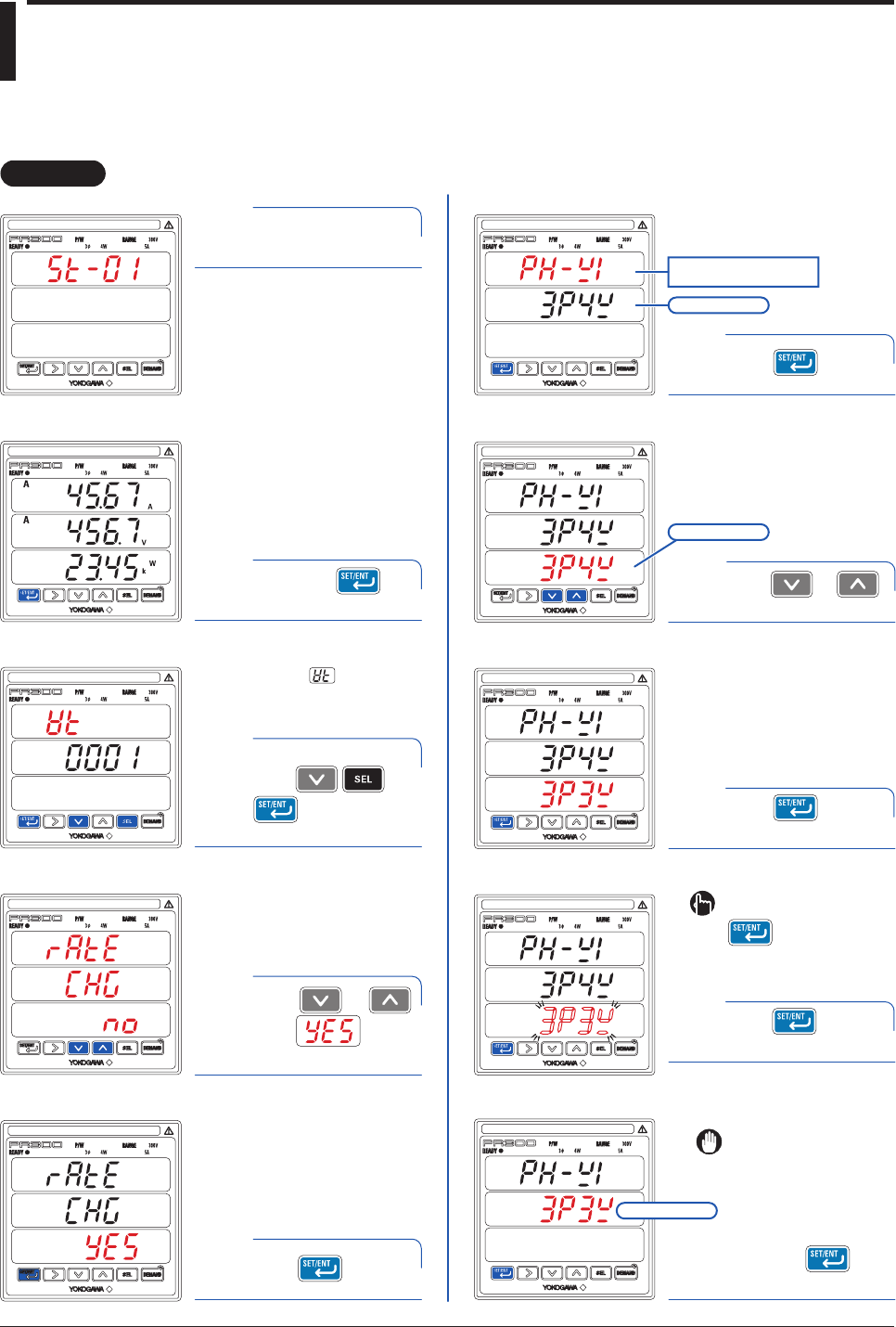Energy Meter Manual
Table Of Contents
- Introduction
- Notices
- Checking the Package
- Checking the Model and Suffix Codes
- Contents
- Chapter 1 Installation and Wiring
- 1.1 Installation with the ANSI 4-inch Round Form or JIS 110-square Instrument Size
- 1.2 Installation with the DIN 96-square Instrument Size
- 1.3 Wiring
- Crimping Terminal Recommendations
- Single-phase two-wire system (voltage input, current input, power supply)
- Single-phase three-wire system (voltage input, current input, power supply)
- Three-phase three-wire system (voltage input, current input, power supply)
- Three-phase four-wire system (voltage input, current input, power supply)
- Three-phase four-wire system (2.5 element) (voltage input, current input, power supply)
- Other Wiring
- 1.4 Attaching the Dust Cover and Terminal Cover
- Chapter 2 Preparations before Starting Measurement (Set up the PR300 First)
- Chapter 3 Parameter Setting Operations
- 3.1 Basic Parameter Setting Operations
- 3.2 Setting the VT and CT Ratios
- 3.3 Setting the Integrated Low-cut Power
- 3.4 Setting RS-485 Communication Conditions
- 3.5 Setting Ethernet Communication Conditions
- 3.6 Setting Pulse Output Conditions
- 3.7 Setting Analog Output Conditions
- 3.8 Setting Demand Measurement Conditions
- 3.9 Setting the Measured Value Display Pattern
- 3.10 Setting the “Indicator-out” Mode and Locking Parameters
- Chapter 4 Operation for Display of Measurement Items and Measurement Method
- 4.1 Measurement Items
- 4.2 Switching Display Pattern
- 4.3 Displaying Measured, Instantaneous, and Maximum/Minimum Values
- Example Display and Measuring Ranges of Active Power (Regenerative Power)
- Example Display and Measuring Ranges of Reactive Power
- Example Display and Measuring Ranges of Apparent Power
- Example Display and Measuring Ranges of Voltage
- Example Display and Measuring Ranges of Current
- Example Display and Measuring Ranges of Power Factor
- Example Display and Measuring Ranges of Frequency
- How to Switch between Instantaneous Value, Maximum Value, and Minimum Value
- 4.4 Phase Switching for Voltage and Current
- 4.5 Displaying Energy Values
- 4.6 Resetting Measured Values
- 4.7 Demand Measurement (Optional Measuring Function)
- Chapter 5 Troubleshooting
- Appendix
- Appendix 1 Specifications of PR300
- Measuring Function
- Power Items and Equations
- Input Specifications
- Digital Input Specifications
- Analog Output Specifications (additional output function)
- Pulse Output Specifications (additional output function)
- Demand Alarm Output Specifications (optional measuring function)
- Communication Specifications
- Standard Performance
- Safety and EMC Standards
- Environmental Conditions
- Mounting and Shape
- Appendix 2 System Reset
- Appendix 3 Parameter Map
- Appendix 4 Parameter List
- Appendix 5 Alphanumeric Characters Table for 7-segment LED
- Appendix 1 Specifications of PR300
- Index
- A
- C
- D
- E
- H
- I
- M
- O
- P
- R
- S
- T
- V
- W
- Wiring diagram
- Single-phase two-wire system
- Single-phase three-wire system
- Three-phase three-wire system
- Three-phase four-wire system
- Three-phase four-wire system (2.5 element)
- Analog output
- Demand alarm output
- Demand alarm release
- Ethernet communication
- Integration control signal
- Palse output
- RS-485 communication
- Wiring diagram

2-2
IM 77C01E01-01E
2.2 Setting the Phase and Wire System
This section explains how to set the phase and wire system by taking as an example the case when a
three-phase four-wire system is changed to a three-phase three-wire system.
Operation
Operation
Hold down for
at least 3 seconds.
Turn on the PR300.
The Specification Change
Confirmation screen appears.
Measured Value screen
Startup screen
VT Ratio screen
2
1
3
Simultaneously hold
down
+
for at least 3
seconds.
Hold down for
at least 3 seconds.
Phase and Wire System screen
6
Specification Change
Confirmation screen
Specification Change
Confirmation screen
4
Press once.
Press once.
Phase and Wire System
screen
Press once to
blink the setpoint.
The parameter (VT ratio)
appears.
The PR300 shows the station
number for about 5 seconds,
then the Measured Value screen
appears.
The Phase and Wire System
screen appears.
The setpoint is confirmed and the PR300
returns to the Phase and Wire System
screen. The phase and wire system
thus set is shown as the current value.
Phase and Wire System
Setting screen
7
The Phase and Wire System
Setting screen appears.
5
Using or ,
show on the
lower display.
Current value
Parameter symbol for
phase and wire system
Current value
Setpoint
Phase and Wire System
Setting screen
8
Press once while
the setpoint is blinking.
9
Phase and Wire System
Setting screen
10
When proceeding to set the
voltage range, start from step
6
in Section 2.3, “Setting the
Voltage Range,” with this
screen (figure on the left)
shown as is.
To re-set the parameter:
Press any key other than
while all digits of the
setpoint are blinking.
The PR300 returns to the initial
setting screen.
Using or ,
select the setpoint.










